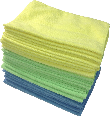Water damage can often be a fairly scary, and often intimidating thing for most homeowners. Usually, the cause for extensive water damage can be a sudden and unexpected thing. Some examples of the causes of water damage are things like a burst pipe, sudden flood, backed up sewage, or possibly your kids leaving the water running while you were out. If the water damage is overly extensive, as it usually is, you are going to want some professionals to come in and do the water damage restoration instead of you doing it yourself. This way you don't miss something, and allow some mold to begin growing and causing health problems for you and your family.
Before you run off and hire the first company that you can find, there are a few things that you can do to begin the process of water damage restoration. Use these guidelines to ensure that you don't overextend yourself, and will allow you to get a good start on what needs to be done.

The Power of Microfiber! Zwipes Microfiber Cleaning Cloths will become your favorite tool for every cleaning task. This 36-cloth package is perfect for hundreds of uses in the garage, kitchen, bathroom, laundry, and all around the house. Each cloth is tough, streak-free, lint-free, reusable, and washable. Check out Microfiber Cleaning Cloths today!
When working with old photographs it is best to try to determine the method by which they were processed before you ...
Discover MoreMoving into a new apartment or home can be both an exciting and daunting event. Exciting because you are getting a new ...
Discover MoreAs with most things in life, having a clean bicycle will help ensure that they are able to work at their best. Cleaning ...
Discover MoreFREE SERVICE: Get tips like this every week in Cleaning Tips from Tips.Net. Enter your address and click "Subscribe."
There are currently no comments for this tip. (Be the first to leave your comment—just use the simple form above!)
FREE SERVICE: Get tips like this every week in Cleaning Tips from Tips.Net. Enter your address and click "Subscribe."
Copyright © 2026 Sharon Parq Associates, Inc.
Comments